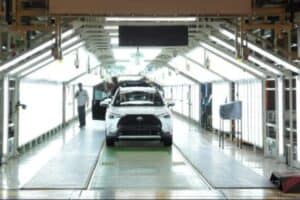The National Consumer Commission has raised concerns over the growing number of vehicle recalls in South Africa.

The National Consumer Commission (NCC) has announced three significant vehicle recalls affecting thousands of South African motorists, with safety defects identified in Volkswagen Golf models, Volvo XC90 hybrids, and Hino 500 commercial vehicles.
NCC Acting Commissioner Hardin Ratshisusu has urged affected consumers to contact their nearest approved dealership immediately for a vehicle inspection at no cost.
This follows notifications from Volkswagen of South Africa, Volvo Cars South Africa, and Toyota South Africa Motors.
Volkswagen Golf models face seat belt defect
Volkswagen of South Africa is recalling 159 Golf 8 vehicles, including both the R and GTI models, sold between 16 April and 30 June 2025.
“These vehicles are being recalled due to a defect in the front passenger seat belt,” according to NCC spokesperson Phetho Ntaba.
The company has identified a manufacturing fault where the front passenger seatbelt may not be properly secured to its lower anchoring point due to errors in the sewing process.
Volkswagen South Africa warned that improper attachment of the belt system’s lower anchoring point significantly reduces the seatbelt’s protective function.
The NCC highlighted the dangers of this defect. It noted that in an accident scenario, the malfunction could result in serious or fatal injuries to occupants of the front passenger seat.
ALSO READ: Volkswagen recalls Polo and Taigo models bought in 2022 and 2024
Volvo XC90 hybrid braking system malfunction
Volvo South Africa also notified the commission about recalling 26 XC90 plug-in hybrid vehicles from the 2025-26 model years due to a potentially dangerous braking system failure.
“The vehicle’s braking functionality may be temporarily disabled while using ‘B’ mode (in plug-in hybrid cars) or One Pedal Drive (in pure electric cars), after coasting downhill for a period,” Ntaba explained.
This malfunction occurs specifically when drivers use regenerative braking modes after extended downhill driving.
The failure of the braking system poses significant collision risks, with potentially serious safety consequences for vehicle occupants and other road users.
ALSO READ: Ford is recalling 2024 Rangers in Southern Africa: Here’s why
Hino 500 series missing essential tools
Toyota South Africa has recalled 6 662 Hino 500 SKD series vehicles and 77 Hino 500 CBU series vehicles due to problems with parking brake release mechanisms.
The affected SKD series vehicles were manufactured between 11 May 2017 and 14 December 2023, while the CBU series vehicles were produced from 31 May 2018 to 25 December 2024, according to Ntaba.
The recall stems from supplier errors where Hino 500 SKD vehicles received incorrect cage bolt spanners, while the CBU series vehicles were delivered without the essential tool entirely.
Although the parking brake continues to function during vehicle operation, drivers cannot release the parking brake without the correct tool.
ALSO READ: Chevrolet cars and Honda motorcycles are being recalled: Here is the list
Rising concern over vehicle safety standards
The NCC has expressed concern about the increasing frequency of vehicle recalls in South Africa.
“The NCC has noted the recent rise of recalls of motor vehicles or related components of such motor vehicles and is engaging affected suppliers for further information to determine the required steps to address this,” acting commissioner Hardin Ratshisusu stated in a statement on Tuesday.
The commission is actively working with suppliers to understand the underlying causes of these safety defects and implement measures to prevent future incidents.
Ratshisusu emphasised the urgency of the situation, advising that “consumers with affected vehicles are urged to urgently book their vehicles with their nearest approved dealerships for a thorough vehicle check, at no cost.”
All three recalls offer free inspections and repairs through authorised dealership networks, with manufacturers covering all costs associated with rectifying the identified defects.
READ NEXT: WATCH: Local docuseries captures South Africa’s love affair with the VW Golf
Support Local Journalism
Add The Citizen as a Preferred Source on Google and follow us on Google News to see more of our trusted reporting in Google News and Top Stories.








